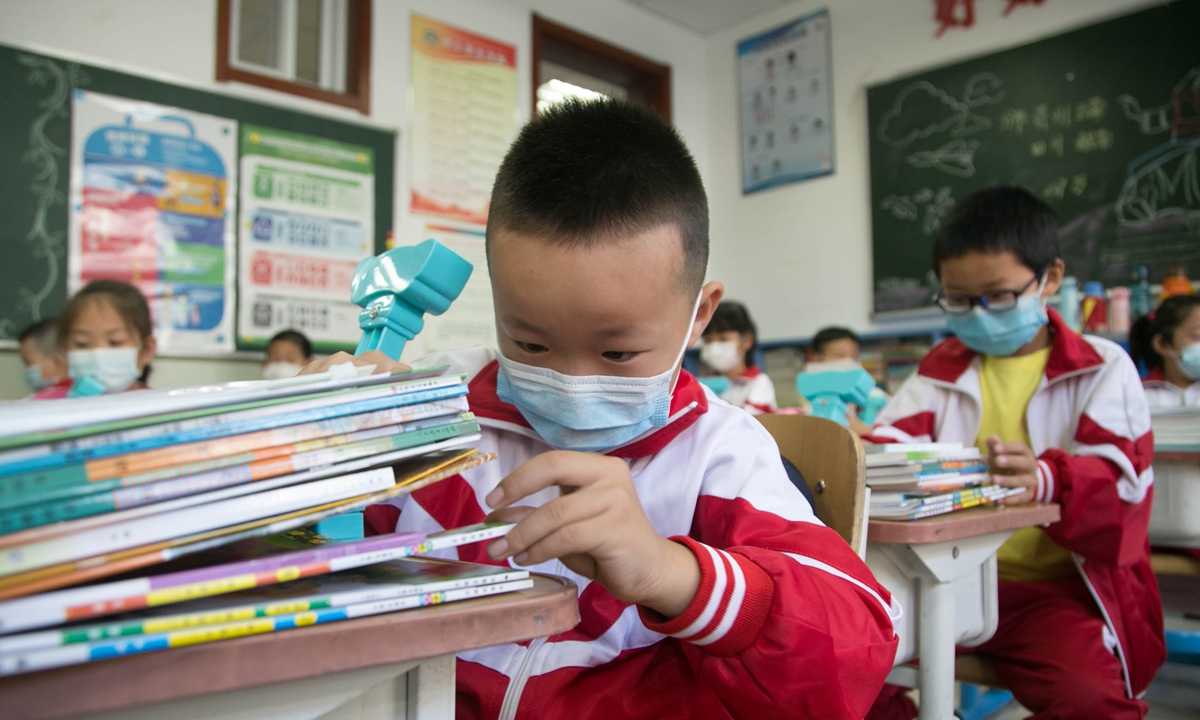Schoolchildren return to mask-free campus life
By Cui Fandi Source: Global Times Published: 2020/9/8 23:04:41

Grade four students in Beijing sort books at a school on Monday. All students in elementary and middle schools in Beijing return to school on Monday after the epidemic ebbs. Photo: VCG
When Chinese parents send their children back to schools and kindergartens again this month, they have one thing less to worry about - that their young children may have trouble breathing with masks on, as schools and kindergartens have lifted their face mask requirement.
As suggested by the National Health Commission (NHC), students no longer need to wear masks full-time on campus starting this fall semester.
In high schools, students are spending most of the day mask-free. A Shanghai high school teacher told the Global Times that students are not required to wear masks in class, but must carry one with them in case.
In primary schools, masks are seldom mandatory. "We only wear masks when having small class discussions and sitting very close to each other," said a grade four student from Beijing. "Generally, we don't wear masks, and try to keep a distance from one another."
In a kindergarten in Beijing, all children are allowed to be mask-free. All staff at the kindergarten, however, must wear face masks at all times in order to protect the children, Xinhua reported.
Dalian in Northeast China's Liaoning Province, which recently saw a second wave of COVID-19 infections, seems to be more cautious. A third-grader at a primary school in Dalian told the Global Times that they usually keep their masks on in class. However, students can take off the masks when playing outdoors between classes. The school has extended intervals between classes and the number of physical education classes to ensure that students get enough activity and rest.
One mother of a 9-year-old child found the mask-free policy reassuring. "I was quite worried that wearing masks might have a negative influence on the kids' studying and exercising due to a potential lack of oxygen," she said. "I'm glad to see they are enjoying campus life like before."
The mask-free policy does not mean that China's schools and kindergartens have let their guard down. A number of preventative measures have been introduced - including staggered campus arrival and dismissal, zoned dismissal, same-direction sitting in the canteen, use of partitions, increased hand washing, regular hand sanitization, and comprehensive campus disinfections - in order to create an orderly and safe atmosphere for student health in cities nationwide.
In April and May, two cases of sudden deaths of students on campus were reported in East China's Zhejiang Province and Central China's Henan Province, which were suspected to be related to intense physical exercise with masks on. These tragedies worried the Chinese public, bringing up safety concerns over prolonged mask-wearing.
In an announcement published by the NHC in August, students at primary schools and middle schools do not need to wear face masks on campus, but should carry one around in case of emergency need. As for young children in kindergarten, due to their special physiological characteristics, masks are not recommended during the day.
"It is equally important that we protect our children from the epidemic, and that we try our best to ensure they can enjoy their campus life," a teacher in Shanghai told the Global Times.
Posted in: SOCIETY